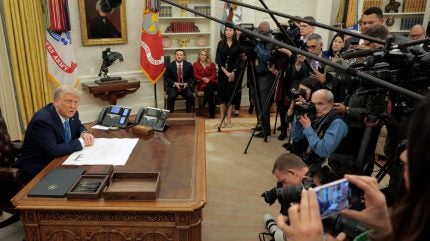
The radical agenda of tariffs being implemented on imports by the new Trump administration in the US likely represents a new status quo for global trade, according to William Bain, head of trade policy at the British Chambers of Commerce.
Speaking on an episode of GlobalData’s Instant Insights podcast, Bain said: “Clearly, we’re into a different global era when it comes to tariffs. We’ve had a prolonged period where it was all about liberalising tariffs, getting them down to zero, eliminating them. We’ve now got the return of tariffs, and we’re likely to face this kind of climate for the foreseeable future.”

Discover B2B Marketing That Performs
Combine business intelligence and editorial excellence to reach engaged professionals across 36 leading media platforms.
Bain was speaking alongside Marco Forgione, director general of the Chartered Institute of Export and International Trade, following the announcement on Saturday (1 February) of new additional 25% tariffs on imports from Canada and Mexico and of 10% from China and the subsequent “pause” on Monday (3 February) to the levies on goods from Canada and Mexico.
That one-month delay has done little to suggest that Trump will pull back from implementing the most sweeping agenda of tariffs in modern US history, with the European Union also firmly in his sights.
Both Bain and Forgione are in agreement that the motivations behind the tariffs are multifaceted, the latter commenting: “I think what’s really important is that we don’t look at the tariffs just as a trade issue. These are geoeconomic and geopolitical tools that are being deployed. The aim of imposing tariffs is to do more than just redress the perceived inequity of the current global trading system. This is very much about leveraging political power and economic power to deliver against that America First agenda.”

Bain too pointed to geopolitics, and in particular issues around defence and security, as being at play, adding: “The ambition of what’s being done this time and the purposes underpinning it seem to be far greater than that from the first Trump administration.”

US Tariffs are shifting - will you react or anticipate?
Don’t let policy changes catch you off guard. Stay proactive with real-time data and expert analysis.
By GlobalDataImpacts of US trade tariffs
While both are of the opinion that the breadth of the tariffs rolled out represents a threat to global trade, they also acknowledged the potential for benefits for the US. Bain suggested these include the onshoring of US production, changing of US supply chains and consumer habits and potential generation of revenue to fund tax cuts within the domestic economy.

Forgione commented: “If you look at tariffs in isolation, there is a view that what tends to happen is neither side wins and you drive up inflation; you just create economic and social problems, lack of employment as a result of the lack of trade.
“But if you look at the comprehensive package that the President is implementing, in part through tariffs, in part through fiscal policy – the announcement that businesses investing in the US will see their taxes reduced, corporation tax will reduce, the intention to remove income tax from the general federal income tax from the general population – I think the markets show themselves that there is uncertainty but a belief that possibly this could be effective for the US economy.”
He added: “It does, however, have implications for everybody else and the rest of the global economy and the intentions of the US geopolitically, particularly with regards to China, and the very clear attempt to force trading partners with the US to de-China their supply chains.”
Despite this, the deterring nature of tariffs means that there will be opportunities for certain industries and businesses around the world as more levies are imposed.
“There could be the likelihood of trade diversion,” explained Bain. “So, goods that would have gone to the United States, but for the tariffs, might start to enter into other markets. So, it’ll be very interesting to see the China export patterns on things like clothing and textiles and footwear over the next few months. There could be issues around diversion of trade into other markets.”
For businesses in the UK, which may be less targeted with US tariffs, Forgione pointed to automotive, aerospace and food and drink as key sectors that could see opportunities.
However, in the event that the US sees sustained retaliatory action from global partners, there is a risk that a global trade war could unfold.
“Global trade is likely to go into reverse if this happens,” warned Bain. “A protracted and expanding trade war is something we’d all want to avoid, but if it happens, we’re simply going to see less cross-border trade, and that will have a significant impact on global growth.”




